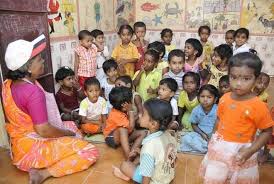
DIPLOMA IN ANGANWADI SUPERVISOR (2 YEAR)
🎓 Diploma in Anganwadi Supervisor – 2 Years
📘 Syllabus Overview
Year 1: Foundation and Core Principles
- Introduction to Anganwadi System
- History and objectives of the ICDS Scheme.
- Structure and functions of Anganwadi centers.
- Roles and responsibilities of Anganwadi Workers and Supervisors.
- Child Development and Early Childhood Education
- Stages of child development (0–6 years).
- Importance of early childhood education.
- Curriculum planning for preschool children.
- Nutrition and Health Care
- Nutritional needs of children and mothers.
- Supplementary nutrition programs.
- Health check-ups and immunization schedules.
- Community Health and Hygiene
- Promoting sanitation and hygiene practices.
- Disease prevention and health education.
- Role of Anganwadi Workers in health campaigns.
- Communication and Interpersonal Skills
- Effective communication with children and community members.
- Conflict resolution and problem-solving.
- Building trust and rapport within the community.
- Record Keeping and Reporting
- Maintaining child growth charts and health records.
- Documentation of services provided.
- Reporting to supervisors and health departments.
Year 2: Advanced Practices and Professional Development
- Advanced Child Development
- Identifying developmental delays and disabilities.
- Special needs education and inclusion.
- Referral systems and support services.
- Community Mobilization and Advocacy
- Engaging community members in health and education programs.
- Advocating for children's rights and welfare.
- Organizing awareness campaigns and workshops.
- Leadership and Management Skills
- Teamwork and collaboration with other community workers.
- Time management and organizational skills.
- Supervisory roles and responsibilities.
- Practical Training and Field Work
- Hands-on experience in Anganwadi centers.
- Observation and participation in daily activities.
- Supervised teaching and community service projects.
- Project Work and Evaluation
- Designing and implementing a community health or education project.
- Monitoring and evaluating project outcomes.
- Presenting findings and recommendations.

